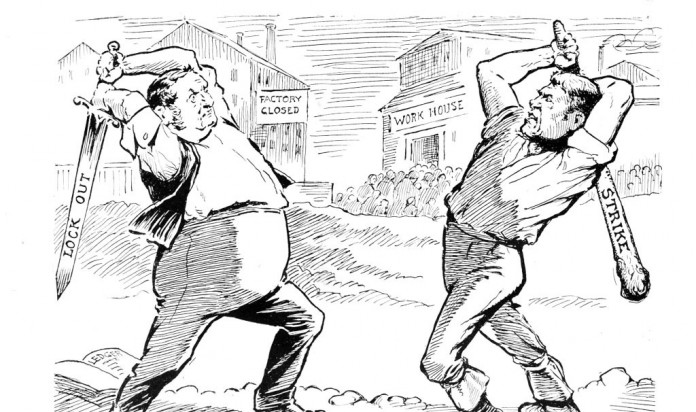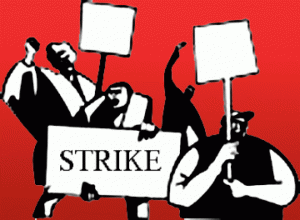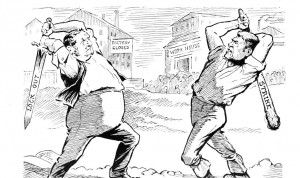In this blog post, Hitender Sharma, a member of the Bar of the District Court Mandi Town, Himachal Pradesh and currently pursuing a Diploma in Entrepreneurship Administration and Business Laws from NUJS, Kolkata, discusses the provisions for general prohibition of strikes and lock-outs.
Strike and lockouts are democratic weapons used by workmen and employers respectively to ventilate their grievances and safeguard their interest. The strike is a weapon available to employees for enforcing their individual demands while the lockout is a weapon available to the employer to persuade workmen by the coercive process to accept his point of view.
What are the provisions defining a Strike?
Webster’s dictionary defines the term strike as “the act of quitting work, done by mutual understanding, by a body of workmen as a means of enforcing compliance with demands made on their employer; a stopping of work done by workmen to obtain or resist a change in the condition of employment”.
Workmen adopt strike as a means to compel the employer to enforce compliance with their demands. Legal definition of strike is given under the Industrial Dispute Act, 1947 under section 2(g) and it defines strike as under:-
“Strike means a cessation of work by a body of persons employed in any Industry acting in combination, or a concerted refusal, or a refusal under a common understanding, of any number of persons who are or have been so employed to continue to work or to accept employment.”
The essential and important ingredient in the definition of strike is the cessation of work which means ‘abandonment’, ‘stoppage’ ‘omission of performance of duties by workmen, ‘hampering or reducing normal works’, hindrance to the working or suspension of work, discontinuing the employment or breaking contract of service or refusing or failing to return to or resume employment or refusing or failing to accept engagement for any work which the workmen are usually employed for. The refusal to work must be concerted or under a common understanding. Cessation of work must, however, be temporary and not forever. It must also be voluntary. Similarly, concerted action is also another important ingredient of the strike. Stoppage of work by worker individually does not amount to strike, and it should be by a body of workers under a common understanding.
What are the provisions defining a Lock-Out?
Webster’s dictionary defines the lockout, to be the withholding of employment by an employer and the whole or partial closing of his business establishment to gain concessions from employees. It is the action of an employer in temporarily closing down his undertaking or refusing to provide work at all, provided by so doing he is seeking to compel his employees to accept the demands either by him or other employers.
The legal definition of lockout is given in section 2(l) of the Industrial Disputes Act, 1947 and it defines Lockout as follows:
“lock-out” means the temporary closing of a place of employment, or the suspension of work, or the refusal by an employer to continue to employ any number of persons employed by him;
The essential requirements of lockout are:-
- There should be some demand for which industrial establishment is locked out.
- The temporary closing of a place of employment/undertaking. The permanent closure does not constitute lockout.
- Intention to re-open or take the worker back if they accept the demand must exist.
- The employer and employees must be engaged in an industrial process carried out in an institution falling within the meaning of industry as defined in section 2(J).
It is only when an employer shuts down his place of business as a means of reprisal or as an instrument of coercion or as a mode of exerting pressure on the employees, or, generally speaking when his act is what may be called an act of belligerency there would be a lockout. If, on the other hand, he shuts down his work because he cannot, for instance, get the raw materials or the fuel or the power necessary to carry on his manufacturing or because he is unable to sell the goods he has made or because his credit is exhausted or because he is losing money, that would not be a lockout.
Provisions for general prohibition of Strikes & Lockouts
Sections 22 and 23 of Industrial Disputes Act, 1947 also contain provisions for a general prohibition of strikes and lockout. Regarding strike, Section 22(1) of the Industrial Disputes Act, 1947 provides that no person employed in a public utility service shall go on strike, in breach of contract—
- without giving the employer notice of a strike, as from now on provided, within six weeks before striking; or
- within fourteen days of giving such notice; or
- before the expiry of the date of strike specified in any such notice as aforesaid; or
(d) during the pendency of any conciliation proceedings before a conciliation officer and seven days after the conclusion of such proceedings.
Section 22(1) prohibits going on strike by the workers except where above conditions are fulfilled. The issue of notice of strike is mandatory. The date of the strike must be within six weeks from the date of issue of strike notice. The day of the strike must not be within 14 days from the date of the notice. There can be no strike on any day before the date specified in the strike notice. Strike by workmen in violation of section 22(1) is illegal.
Section 22(2) of the Industrial Disputes Act, 1947 provides that no employee of any public utility service shall lock-out any of his workmen-
(a) without giving them notice of lock-out as hereinafter provided, within six weeks before locking out; or
(b) within fourteen days of giving such notice; or
(c) before the expiry of the date of lock-out specified in any such notice as aforesaid; or
(d) during the pendency of any conciliation proceedings before a conciliation officer and seven days after the conclusion of such proceedings.
Thus, Section 22(2) of Industrial Disputes Act, 1947 prohibits employer to declare lockout without complying with above conditions. Any lockout without complying with above conditions is illegal.
Where there is already in existence a strike or, as the case may be, lockout in the public utility service, the notice of lock-out or strike shall not be necessary but the employer or workmen as the case may be shall send intimation of such lock-out or strike on the day of which it is declared, to such authority as may be specified by the appropriate Government either generally or for a particular area or a particular class of public utility services.
It means that if there is already in existence a strike, the notice of lockout is not necessary and if there is already in existence a lockout, the notice of strike is not necessary. In such cases, the parties concerned have to send intimation of such lockout or strike to such authority as may be specified in this behalf by the appropriate Govt. on the day of which it is declared.
Provisions for general prohibition of strikes and lock-outs in General Industries
Section 22 of Industrial Disputes Act deals with the strike and locks out in public utility services while Section 23 deals with strikes and lockout in general industries or which are not public utility services. In industries which are not public utility services, the strikes and lockout may be declared by the workmen and employers respectively without giving any notice of strike or lockout.
However, there are certain restrictions according to Section 23 of Industrial Disputes Act, 1947 which provide that no workman who is employed in any industrial establishment shall go on strike in breach of contract, and no employer of any such workman shall declare a lock-out—
- during the pendency of conciliation proceedings before a Board and seven days after the conclusion of such proceedings;
- during the pendency of proceedings before a Labour Court, Tribunal or National Tribunal] and two months, after the conclusion of such proceedings; during the pendency of arbitration proceedings before an arbitrator and two months after the conclusion of such proceedings, where a notification has been issued under sub-section (3A) of Section 10 A ;
- During any period in which a settlement or award is in operation, in respect of any of the matters covered by the settlement or award.
Provisions of Section 22 which govern strikes and lockouts in public utility services are not applicable to industrial establishments which are not public utility services while provisions of Section 23 are general in character and therefore apply to public utility services as well.
Section 23 provides that in the case of General Industries during the pendency of any conciliation proceedings before an officer conciliation strike or lockout can be resorted to. While section 22 dealing with public utility services provides that no strikes or lockout can resort to if any conciliation proceedings are pending before a conciliation officer.
Provisions for considering Strikes and Lockout as illegal
Section 24 of the Industrial Disputes Act, 1947 clarifies when a strike or a lock-out shall be illegal. It provides as follows:
- it is continued in contravention of an order made under section 10 (3) or
- It is commenced or declared in contravention of Section 22 or Section 23; or
- it is continued in contravention of an order made under Section 10-A (4-A)
According to Section 24 under clauses (2) and (3), the strike or lockout shall not be illegal if it is in pursuance of an industrial dispute that has already commenced and is in existence at the time of the reference of the dispute to a Board, an arbitrator, Labour Court, Tribunal or National Tribunal. The continuance of such strike or lock-out shall not be considered illegal, provided such strike or lock-out was not at its commencement in contravention of the provisions of this Act, or the continuance thereof was not prohibited under section 10 (3) or section 10-A( 4-A). A lock-out declared in consequence of an illegal strike or a strike declared in consequence of an illegal lock-out shall not be deemed to be illegal.
Provisions for penalty for illegal strikes and lock-outs
Penalties provided under Section 26 of Industrial Disputes Act for illegal strikes and lockouts also act as a deterrent against strikes and lockouts. There is a provision for punishment of imprisonment for a term which may extend to one month, or with fine which may extend to fifty rupees, or with both for an illegal strike. Similarly, there is a provision for punishment for imprisonment for a term which may extend to one month, or with fine which may extend to one thousand rupees, or with both for illegal lockout
The objective of Industrial Disputes Act is to regulate the right of workmen to strike and right of the employer for lockout without denying them their respective rights. This legislation has also provided machinery for peaceful investigation, settlement, arbitration and adjudication of the disputes.
Where such industrial legislation is not applicable, the contract of employment and service rules provides for are suitable machinery for resolution of the disputes. Where the law of contract for employment or service rules provides machinery for resolution of disputes, resort to lockout or strike as a direct action in contravention of contract or service rules is illegal.
 Serato DJ Crack 2025Serato DJ PRO Crack
Serato DJ Crack 2025Serato DJ PRO Crack














 Allow notifications
Allow notifications


